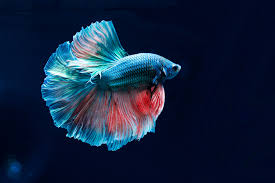
Betta (Siamese fighting fish)
Conditions of detention
Betta fish thrive in a well-maintained tank that mimics their natural environment. They prefer a tank with a capacity of at least 2.5 gallons, although a 5-gallon tank or larger is ideal. The water should be kept at a stable temperature between 76-82°F (24-28°C) and should be filtered and dechlorinated. Bettas do well with plenty of hiding spots and gentle water flow.
Useful Fact: Betta fish are labyrinth fish, meaning they can breathe air from the surface, which allows them to survive in low-oxygen environments.
Nutrition and diet
Betta fish are carnivorous and require a protein-rich diet. They thrive on a diet of high-quality betta pellets, supplemented with live or frozen foods like brine shrimp, bloodworms, and daphnia.
Useful Fact: Overfeeding can lead to obesity and water quality issues; feed your Betta small amounts 1-2 times per day, only what they can eat in about 2 minutes.
Health
Bettas are generally hardy, but they can be susceptible to common freshwater fish diseases such as fin rot, ich, and velvet. Stress, poor water quality, and overfeeding can contribute to these conditions.
Useful Fact: Maintaining a clean tank with stable water conditions is key to preventing most health issues in Betta fish.
Grooming and care
While Betta fish don’t require grooming in the traditional sense, maintaining their environment is crucial. Regular water changes (about 25-50% weekly) and monitoring water parameters are essential for their health.
Useful Fact: Betta fish are known for their long, flowing fins, which can be prone to tearing. Avoid sharp decorations in the tank to prevent fin damage.
Education and training
Betta fish are intelligent and can learn to recognize their owners, follow a finger, and even perform simple tricks like jumping for food or swimming through hoops.
Useful Fact: Using a small mirror occasionally can provide mental stimulation for your Betta, as they will flare their fins in response to their reflection, mimicking natural behavior.
Toys and entertainment
Bettas enjoy exploring their environment. Floating betta logs, mirrors (used sparingly), and silk plants can provide enrichment and prevent boredom.
Useful Fact: Betta fish can become bored in a sparse environment, so adding plants and decor can keep them mentally stimulated.
Safety
Betta fish are solitary and highly territorial, especially males, and should not be kept with other bettas in the same tank. Tankmates should be carefully chosen to avoid fin-nipping or aggression.
Useful Fact: Male Betta fish should never be housed together, as they will fight, often to the death.
Accessories
Essential accessories for Betta fish include a heater to maintain the proper temperature, a gentle filter, and a light source. Plants (live or silk) and hiding places like caves or logs are also important.
Useful Fact: A thermometer is essential to monitor the tank temperature, as Betta fish are sensitive to temperature fluctuations.
Socialization
Bettas are naturally solitary fish. While they don’t require social interaction, they can become stressed if kept in a tank with unsuitable tankmates. Females can sometimes be kept in a group called a sorority, but this requires careful management.
Useful Fact: If you choose to keep a sorority of female Bettas, ensure the tank is large enough and heavily planted to minimize aggression.
Travel and Transportation
When transporting a Betta fish, use a small container with a secure lid to prevent spills. The container should have enough water to keep the fish submerged but not so much that it sloshes excessively.
Useful Fact: When traveling with a Betta fish, avoid extreme temperature changes, as they are very sensitive to temperature fluctuations.
Behavior and psychology
Betta fish are known for their aggressive and territorial behavior, particularly males. They display by flaring their gills and spreading their fins when they perceive a threat. Despite this, they are also curious and can become attached to their owners.
Useful Fact: Betta fish are more active and display better colors when they are healthy and in a properly maintained environment.
Legal aspects
There are generally no specific legal restrictions on owning Betta fish, but it’s important to ensure they are sourced from reputable breeders or suppliers to avoid supporting unethical practices.
Useful Fact: When purchasing a Betta fish, it’s important to choose one from a store that provides clean, well-maintained tanks to reduce the risk of disease.


